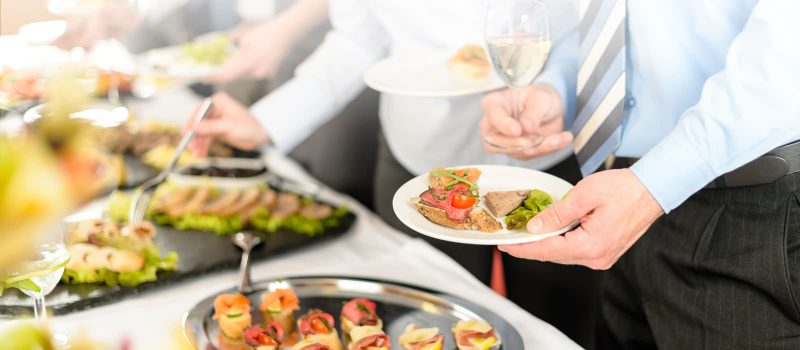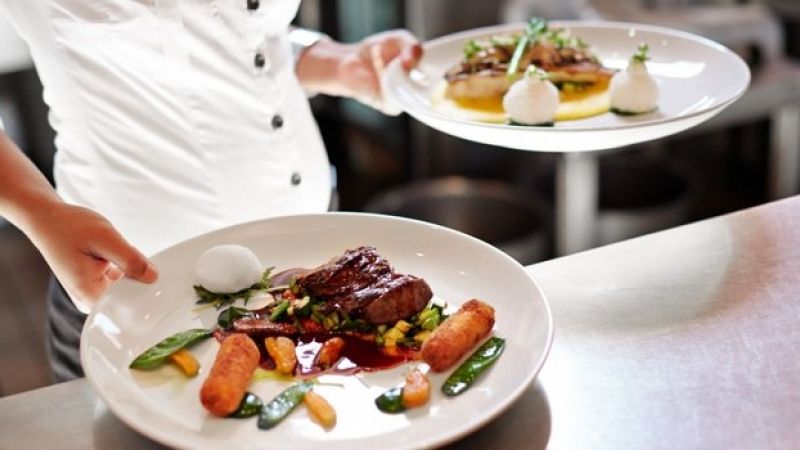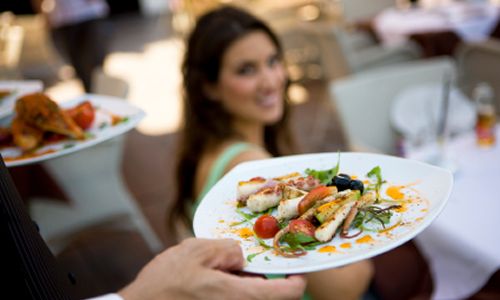When you plan an event there are many bases to be covered. One important base you shouldn't fret over is how to serve your food. There are many different ways to actually go about this, so let's break it down.
One event can utilize every type of service. At Cvent CONNECT our planners can combine multiple types in the span of an hour.
Often the style of service will influence the types and varieties of foods the caterer can offer. For instance, foods that will be passed on trays by servers during an afternoon reception must be easy to handle. They also have to hold up well. You don't want sauce dripping, causing a mess during an important speech.
Here is a breakdown of what the types of service are and what do they really mean:
Reception Service
- This one is easy, think finger food.
- Light foods are served displayed buffet-style on a table and guests usually stand and serve themselves. Avoid food that is difficult to eat and requires a knife.
Butlered Hors d’ Oeuvres Service
- Food is put on trays in the kitchen and passed by servers while the guests stand/walk around.
- Guests serve themselves, using cocktail napkins provided by the server. This is a typical style of service used for upscale receptions.
- Only appropriate for “finger food.”
Buffet Service
- Arrange the food on tables and show a clear flow. Guests move along the buffet line and serve themselves then choose their seats. Servers usually provide beverage service at tableside but this is not mandatory. An elegant buffet would have servers carry guests’ plates to their tables for them.

Action Stations
- This service is similar to a buffet. Chefs prepare and serve foods at the buffet (rather than in the kitchen).
- Examples: Wok stations, mashed potato bars, fajitas, pastas, grilled meats, omelets, crepes, sushi, flaming desserts and spinning salad bowls.
- Also referred to as “performance stations” or “exhibition cooking.”
Cafeteria Service
- Guests stand in line, but do not help themselves. They are served by chefs and/or servers from behind the buffet line.
- This is a secret to controlling portions. Sometimes the inexpensive items, such as salads, will be self-service, and the expensive meat items will be served by an attendant.
Plated Buffet Service
- Selection of pre-plated foods, such as entrees, sandwich plates and salad plates, set on a buffet table.
- They may also be placed on a roll-in (a i.e., rolling cart or table) and then moved into the function room at the designated time.
- Because of individual plates, trays are usually used. This is a particularly good idea for groups who want to continue “working” meals while they eat.
Plated (American) Service![]()
- Guests are seated and the food is served the left. Beverages are served from the right. Used dishes and glasses are removed from the right.
- This is the most functional, common, economical, controllable and efficient type of service. However, if foods are plated too far in advance, they could run together, discolor, or otherwise lose culinary quality.
Family-style (English) Service
- Guests are seated and large serving platters are set on the dining tables by servers to share.
- Guests help themselves from a lazy Susan or they pass the foods to each other.
- Optional: A host could carve the meat for the table.
Pre-set Service
- Food is set on the dining tables when guests are seated. Since pre-set foods will be on the tables for a few minutes before they are consumed, the food needs to be kept at a good temperature and sanitary.
- Most common are bread and butter, but often the appetizer will be pre-set as well. For lunches with a limited time frame, occasionally salad and dessert will be pre-set.
Hand Service
- Guests are seated and there is one server for every two guests. Servers wear white gloves.
- Foods are pre-plated and the plates are fitted with dome covers. Each server carries two servings from the kitchen and stands behind the two guests assigned to him or her. At the direction of the captain or maitre d’ hotel, all servings are set in front of all guests, and their dome covers are removed, at precisely the same time.
- This procedure is may be followed for all courses. This is a very elegant style of service that is sometimes used for small gourmet -meal functions.
The Wave
- This is a ‘quick and dirty” method of serving where all servers start at one end of the function room and work straight across to the other end.
- Servers are not assigned workstations. In effect, all servers are on one team and the entire function room is the team’s work station.
- The wave is typically used in conjunction with plated and pre-set service styles. Large numbers of guests can be served very quickly, usually using less labor. It does not provide individualized service for attendees.
Find Private Dining Restaurants for your next group dining event, private party or business lunch in the U.S. and worldwide on the Cvent Supplier Network.






